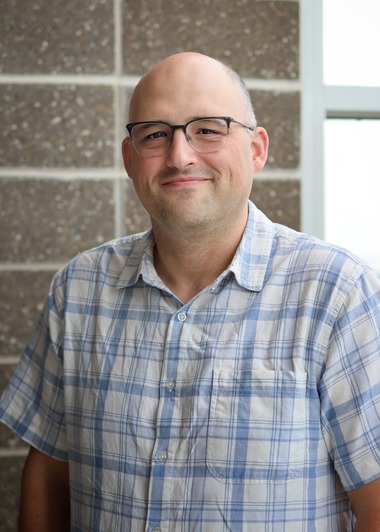Dr. Micah Ferrell
Micah Ferrell is a postdoctoral fellow in MGI who works in Dr. Chris Waters lab. Here
are his answers to the Micro Biography questions:

How and when did you become interested in the field(s) of microbiology, genetics, and/or immunology?
I was interested in biology from a very early age. I grew up in Alaska right at the
edge of town, so I spent a lot of my time in the woods, marveling at nature. When
I was in elementary school, National Geographic magazine wrote a story about bacteria
that enraptured me. I was fascinated by how these marvelous creatures lived on and
in everything and everyone.
Were there any particular people or events who were influential in your journey?
My parents, John and Lorraine, greatly influenced my interest in science. They are
both trained geologists who constantly encouraged my curiosity, bought me my first
microscope, and forgave all the messes from my amateur experiments. I have also been
blessed with excellent mentors during my education. My high school biology teachers,
Betty Connor, and Cyndie Beale, were both excellent and also got me in touch with
Gary Laursen, a mycology professor at the University of Alaska who mentored me in
my first microbiology-related science fair project. In college at the University of
Idaho, I really got to know my microbiology professors and did undergraduate research
in Scott Minnich’s lab. I stayed at Idaho to do an M.S. with Doug Cole, a fantastic
biochemist of the old breed who taught me a lot of the great tricks in protein science.
Finally, when I went back to school for my Ph.D., I had the good fortune to end up
in Patricia Champion’s lab at Notre Dame, where I learned about the awesome power
of bacterial genetics to answer fundamental questions about life itself.
How did you come to be a part of this department?
I was doing a postdoc before this one at Washington University in St. Louis, but I
wasn’t enjoying it. I really missed mentoring undergraduates and graduate students
in the laboratory. I jumped at the opportunity when I saw that Chris Waters at Michigan
State was recruiting postdocs. I had seen Chris’ work at regional conferences and
knew about the creative and innovative work being done in his lab. I was also attracted
to the reputation of the MGI department as an outstanding research community.
What is your main research area right now and why is it important?
I am currently studying the AvcID phage defense system, which was discovered by previous
members of the Waters lab. AvcID is a toxin-antitoxin system, where the toxin becomes
activated when the bacteria is infected by a bacteriophage virus, poisoning the cell
and stopping the virus from reproducing. In my work, I have discovered an additional
layer of regulation of this system, which answers some outstanding questions about
how this system is kept inactive until it senses an infection. Phages exert a major
influence on the dynamics of microbial communities and their evolution, and the systems
that provide defense are exquisitely evolved. There is growing interest in using phages
to treat antibiotic-resistant bacterial infections. However, our lack of knowledge
about the distribution and mechanisms of phage defense is a major barrier to developing
phage into a routine therapeutic.
How do you see your research evolving?
In addition to characterizing how AvcID is regulated, my work extends to secondary
regulation of other phage defense systems. Phage defense is, in essence, a bacterial
immune system, and much like the vertebrate immune system, its activities must be
kept under tight regulation to avoid toxic off-target effects.
What types of activities are you involved in outside of research?
When the weather is nice I enjoy riding my bicycle on the many trails around East
Lansing. I am an avid reader and have far too many books and not enough time to read
all of them.
Is there anything else you’d like to share?
I love that the winters in Michigan are so short and mild!
What is next for you?
Right now I am working on getting my AvcID results published. I think this deceptively simple system has much much more to teach me.
What do you see as your current career trajectory?
I would really like to find a faculty position at a research university where I can continue doing science and mentoring the next generation of scientists.